2B句子总复习
九年级上次第四单元2b语法知识点

九年级上次第四单元2b语法知识点在九年级上学期的英语学习中,第四单元的2b语法知识点是我们需要掌握的重要内容。
掌握这些语法知识点不仅可以帮助我们更好地理解英语的句子结构,而且在写作和口语表达中也有很大的帮助。
在本文中,我们将对这些语法知识点进行深入的探讨和分析。
一、直接引语和间接引语在英语中,直接引语和间接引语是两种不同的表达方式。
直接引语是对别人说话的直接引述,而间接引语则是将别人说的话转述出来。
当我们将直接引语转换为间接引语时,需要注意时态、人称和地点的变化。
例如,直接引语:“I am going to the library,” Tom said.间接引语:Tom said that he was going to the library.在这个例子中,我们可以看到直接引语中的时态和人称发生了变化,动词am变为was, 还有人称变为he。
二、被动语态被动语态是英语中的一个重要语法知识点。
当我们讨论某个动作的接受者比实施者更重要时,通常使用被动语态。
被动语态的结构为:be + 过去分词。
例如,主动语态:They built a new school in our neighborhood.被动语态:A new school was built in our neighborhood by them.在这个例子中,我们可以看到主动语态中的主语they变为了被动语态中的by短语,而动词built变为了被动语态中的was built。
三、情态动词情态动词在英语语法中也是非常重要的一部分。
情态动词包括can, could, may, might, must, should, would等。
它们用来表示说话人的意愿、能力、可能性、推测和义务等。
例如,情态动词can用来表示能力:I can swim.情态动词should用来表示建议:You should eat more vegetables.在这个例子中,我们可以看到can表示我具有游泳的能力,而should则表示建议你多吃蔬菜。
九年级英语 2b知识点

九年级英语 2b知识点在九年级英语的学习中,2b单元是一个重要的知识点。
本文将对九年级英语 2b知识点进行详细解析,并提供相关例子和练习,帮助同学们更好地掌握这些知识。
1. 过去完成时(Past Perfect Tense)过去完成时用于表示在过去某个时间或动作之前已经发生的动作或状态。
其结构为 had + 过去分词。
例子:I had finished my homework before my parents came back home.在我父母回家之前,我已经完成了作业。
练习:用适当的形式填空。
1. She ______ (already, leave) when I arrived at the station.2. By the time we got to the cinema, the film ______ (start).2. 虚拟语气(Subjunctive Mood)虚拟语气常用来表示假设、愿望、建议等。
常见的虚拟语气结构有:should + 动词原形、had + 动词过去分词、were + 动词原形等。
例子:If I were you, I would go to the party.如果我是你,我会去参加派对。
练习:根据括号内的要求完成句子。
1. I wish I ________ (have) more time to study.2. If he ________ (be) more careful, he wouldn't have fallen off the bike.3. 情态动词的用法(Modal Verbs)情态动词用于表示说话者对某种行为或状态的看法、推测、能力、请求等。
常见的情态动词有 can, could, may, might, must, should, need等。
例子:You can borrow my pen if you need one.如果你需要笔,你可以借我的。
八年级上册英语第六单元2b 知识点

八年级上册英语第六单元2b 知识点本文主要介绍八年级上册英语第六单元2b的知识点,内容包括词汇、语法和阅读技巧等方面,帮助同学们更好地掌握单元知识,提高英语水平。
一、词汇1. a variety of:各种各样的例如:There are a variety of fruits on the table.2. lead to:导致,通向例如:Smoking can lead to many health problems.3. common:普遍的例如:Cycling is a common way to keep fit.4. increase:增加例如:The price of houses has increased a lot in recent years.5. population:人口例如:The population of China is over 1.4 billion.6. pollution:污染例如:We should take measures to reduce pollution.7. environment:环境例如:We need to protect the environment for the next generation.8. reduce:减少例如:We should reduce the waste of water.9. impact:影响例如:The invention of the Internet has a great impact on people's life.10. climate change:气候变化例如:Climate change has become a global problem.二、语法1. 形容词比较级和最高级的用法最高级的用法:1)One of + 最高级 + 具体的名词复数形式,意为“最……之一”。
例如:He is one of the most famous singers in the world.2)The + 最高级 + 名词单数形式,意为“最……的……”。
人教版九年级英语第五单元2b知识点
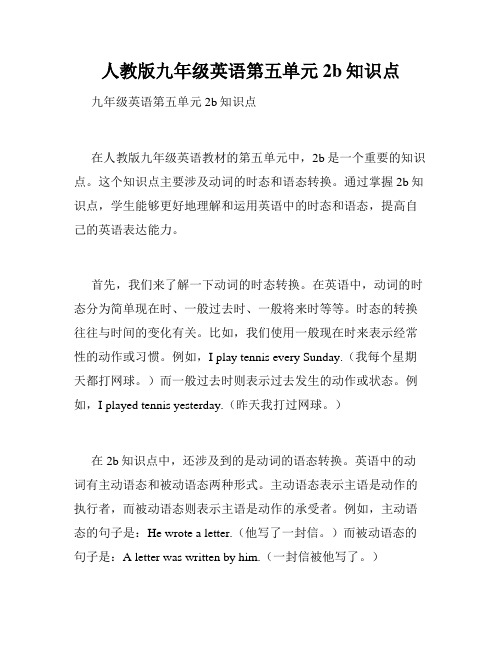
人教版九年级英语第五单元2b知识点九年级英语第五单元2b知识点在人教版九年级英语教材的第五单元中,2b是一个重要的知识点。
这个知识点主要涉及动词的时态和语态转换。
通过掌握2b知识点,学生能够更好地理解和运用英语中的时态和语态,提高自己的英语表达能力。
首先,我们来了解一下动词的时态转换。
在英语中,动词的时态分为简单现在时、一般过去时、一般将来时等等。
时态的转换往往与时间的变化有关。
比如,我们使用一般现在时来表示经常性的动作或习惯。
例如,I play tennis every Sunday.(我每个星期天都打网球。
)而一般过去时则表示过去发生的动作或状态。
例如,I played tennis yesterday.(昨天我打过网球。
)在2b知识点中,还涉及到的是动词的语态转换。
英语中的动词有主动语态和被动语态两种形式。
主动语态表示主语是动作的执行者,而被动语态则表示主语是动作的承受者。
例如,主动语态的句子是:He wrote a letter.(他写了一封信。
)而被动语态的句子是:A letter was written by him.(一封信被他写了。
)了解了动词的时态和语态转换之后,我们就可以更加灵活地运用它们来表达自己的意思。
时态和语态的正确运用非常重要,可以避免产生歧义,提高交流的准确性。
因此,在学习英语的过程中,我们需要不断地练习和掌握这些知识点。
此外,在掌握了动词的时态和语态转换之后,我们还可以运用它们来进行某些特定的表达。
比如,通过将动词的时态和语态转换,可以表达对过去发生的事情的猜测或推测。
例如,He can't have seen the movie.(他不可能看过这部电影。
)这个句子中使用了情态动词can't和完成时态have seen来表达对过去事实的否定推测。
2b知识点还涉及到一些其他的语法现象,比如助动词的使用和句子的结构。
例如,在一般疑问句中,我们需要将助动词置于主语之前。
2B 词组及句子
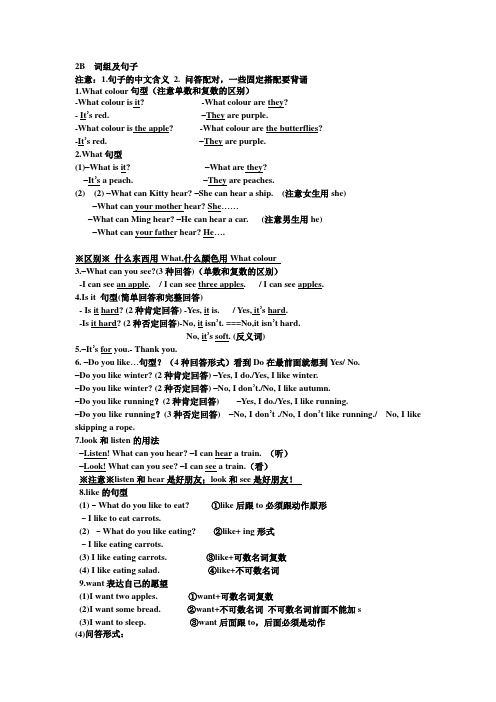
2B 词组及句子注意:1.句子的中文含义2. 问答配对,一些固定搭配要背诵1.What colour句型(注意单数和复数的区别)-What colour is it? -What colour are they?- It’s red. –They are purple.-What colour is the apple? -What colour are the butterflies?-It’s red. –They are purple.2.What句型(1)–What is it? –What are they?–It’s a peach. –They are peaches.(2) (2) –What can Kitty hear? –She can hear a ship. (注意女生用she)–What can your mother hear? She……–What can Ming hear? –He can hear a car. (注意男生用he)–What can your father hear? He….※区别※什么东西用What,什么颜色用What colour3.–What can you see?(3种回答)(单数和复数的区别)-I can see an apple. / I can see three apples. / I can see apples.4.Is it 句型(简单回答和完整回答)- Is it hard? (2种肯定回答) -Y es, it is. / Yes, it’s hard.-Is it hard? (2种否定回答)-No, it isn’t. ===No,it isn’t hard.No, it’s soft. (反义词)5.–It’s for you.- Thank you.6. –Do you like…句型?(4种回答形式)看到Do在最前面就想到Y es/ No.–Do you like winter? (2种肯定回答) –Yes, I do./Yes, I like winter.–Do you like winter? (2种否定回答) –No, I don’t./No, I like autumn.–Do you like running?(2种肯定回答) –Yes, I do./Yes, I like running.–Do you like running?(3种否定回答) –No, I don’t ./No, I don’t like running./ No, I like skipping a rope.7.look和listen的用法–Listen! What can you hear? –I can hear a train. (听)–Look! What can you see? –I can see a train.(看)※注意※listen和hear是好朋友;look和see是好朋友!8.like的句型(1)–What do you like to eat? ①like后跟to必须跟动作原形–I like to eat carrots.(2) –What do you like eating? ②like+ ing形式–I like eating carrots.(3) I like eating carrots. ③like+可数名词复数(4) I like eating salad. ④like+不可数名词9.want表达自己的愿望(1)I want two apples. ①want+可数名词复数(2)I want some bread. ②want+不可数名词不可数名词前面不能加s(3)I want to sleep. ③want后面跟to,后面必须是动作(4)问答形式:What do you want? –I want some milk. (注意milk拼写,不可数名词前加some )10.go的句型(go后面直接跟动作的话,动作要加ing形式) Let’s go swimming.11.季节与形容词和动作的匹配及穿着的衣服Spring is nice and warm. I like riding my bicycle.Summer is sunny and hot. I like swimming in the water.Autumn is windy and cool. I like flying a kite.Winter is cloudy and cold. I like skating on the ice.衣服:Spring:shirt,sweater,coat,trousersSummer: dress, skirt, T-shirt, shortsAutumn: shirt,sweater,coat,trousersWinter: sweater, coat, trousers12.Let’s 句型–It’s red. Let’s stop. 回答3种:OK.//Yes.// All right.13.知道交通灯与颜色配对It’s red. Let’s stop.红灯停It’s yellow. Let’s wait.黄灯等待It’s green. Let’s go.绿灯走(交通灯的颜色,从上到下是红,黄,绿)14.have句型(1) I have a dog. (3)He has a dog.(2 )You have a dog. (4)She has a dog.(5)It has long tails.(7)Kitty and Alice have dogs. (6) Kitty has a dog.(8)They have dogs.※have,has用法※I我,you你,两个人以上用have,其他用has。
九年级上册英语八单元2b知识点

九年级上册英语八单元2b知识点总结英语作为国际交流的重要工具,在九年级的学习中占据了重要的位置。
第八单元的2b部分是九年级上册英语中的重要内容之一。
下面将对这个知识点进行总结和分析,帮助同学们更好地理解和掌握这一部分的内容。
2b部分主要囊括了以下知识点:1. 条件句(Conditional Sentences)条件句是英语中的一种句型,表示假设、条件和结果之间的关系。
根据是否是真实条件,条件句可以分为三种类型:第一型(真实条件)、第二型(不太可能实现的条件)和第三型(不可能实现的条件)。
例如,第一型条件句的句型结构为:if + 现在时态,将来时态(主语 + will + 动词原形)。
比如,If it rains tomorrow, we willstay at home.(如果明天下雨,我们将呆在家里。
)2. 名词从句(Noun Clauses)名词从句是指在句子中作为名词用的从句。
它可以充当主语、宾语、表语和同位语等。
常见的名词从句引导词有that、whether、if、when、where、why等。
例如,I don't know how they did it.(我不知道他们是如何做到的。
)这里的how they did it就是一个名词从句,作为宾语出现在know后面。
3. 定语从句(Adjective Clauses)定语从句是指在句子中做定语用的从句,用来限制或修饰先行词。
常见的引导词有who、whom、whose、which、that等。
例如,The girl who is wearing a red dress is my sister.(穿红裙子的女孩是我妹妹。
)这里的who is wearing a red dress修饰了girl,起到了定语的作用。
4. 状语从句(Adverbial Clauses)状语从句是指在句子中做状语用的从句,用来表示原因、目的、条件、结果、时间、地点等。
八年级上册英语第三单元2b课文知识点

八年级上册英语第三单元2b课文知识点英语是一门需要不断积累的语言,特别是对于初中生来说,每单元的知识点都需要认真学习,深刻理解。
本文将会为大家总结八年级上册英语第三单元2b课文的知识点,希望对大家的英语学习有所帮助。
1. 课文内容简介本课文主要介绍了一位名叫阿里的男孩,在假期里去了海边。
阿里和他的朋友们一起在海边玩耍,他们摸到了很多海洋生物,如:海星、螃蟹、海龟。
他们还建立了一个沙堡,并在晚上享受了美食和烟花表演。
2. 生词beach 海滩starfish 海星crab 螃蟹turtle 海龟castle 城堡fireworks 烟花3. 重点词组① pick up 捡起;拾起例句:We picked up some starfish on the beach.(我们在海滩上捡起了一些海星。
)② hold up 举起例句:Can you hold up this crab for me, please?(你能帮我举起这只螃蟹吗?)③ put…together 拼凑起来例句:We put together a sandcastle on the beach.(我们在海滩上拼凑起了一个沙堡。
)4. 重点句子① We picked up some starfish on the beach.翻译:我们在海滩上捡起了一些海星。
② We saw a crab crawling along the beach.翻译:我们看到一只螃蟹在海滩上爬行。
③ We put together a sandcastle on the beach.翻译:我们在海滩上拼凑起了一个沙堡。
④ We enjoyed the fireworks on the beach at night.翻译:我们在晚上在海滩上欣赏了烟花表演。
5. 文化背景海边的活动是很多人喜欢的一种度假方式。
在美国,生活在海滨城市的人们经常会在周末和假期去海边游玩、晒太阳、钓鱼或者开趴。
九年级第二单元英语2b知识点
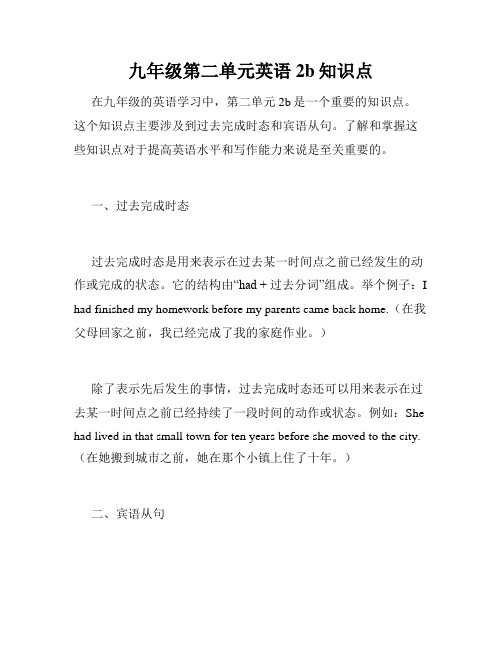
九年级第二单元英语2b知识点在九年级的英语学习中,第二单元2b是一个重要的知识点。
这个知识点主要涉及到过去完成时态和宾语从句。
了解和掌握这些知识点对于提高英语水平和写作能力来说是至关重要的。
一、过去完成时态过去完成时态是用来表示在过去某一时间点之前已经发生的动作或完成的状态。
它的结构由“had + 过去分词”组成。
举个例子:I had finished my homework before my parents came back home.(在我父母回家之前,我已经完成了我的家庭作业。
)除了表示先后发生的事情,过去完成时态还可以用来表示在过去某一时间点之前已经持续了一段时间的动作或状态。
例如:She had lived in that small town for ten years before she moved to the city.(在她搬到城市之前,她在那个小镇上住了十年。
)二、宾语从句宾语从句是用来充当动词、形容词或名词的宾语的句子。
它常常用来转述别人的话或表示观点、感受、决定等。
宾语从句的引导词通常包括:that, whether, if, who, whom, whose, which, or, when, where等。
例如:He asked me if I could help him with his homework.(他问我能否帮他做家庭作业。
)值得注意的是,宾语从句中的时态与主句的时态有一定的关系。
如果主句是现在时,宾语从句中的动词时态一般不变;如果主句是过去时,宾语从句中的动词时态通常需要做相应的转换。
在应用宾语从句时,我们需要注意语序的变化。
例如:I know that she is a doctor.(我知道她是一名医生。
)在这个例子中,宾语从句中的句子结构与主句的语序基本一致。
但是,如果宾语从句中有一些特殊疑问词或连接副词,则需要将其提到句首。
例如:I wonder where he went yesterday.(我想知道他昨天去哪里了。
英语八年级下册2单元2b知识点
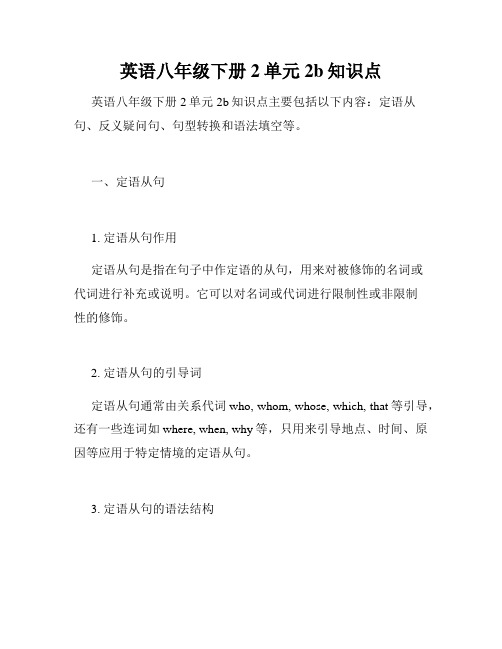
英语八年级下册2单元2b知识点英语八年级下册2单元2b知识点主要包括以下内容:定语从句、反义疑问句、句型转换和语法填空等。
一、定语从句1. 定语从句作用定语从句是指在句子中作定语的从句,用来对被修饰的名词或代词进行补充或说明。
它可以对名词或代词进行限制性或非限制性的修饰。
2. 定语从句的引导词定语从句通常由关系代词who, whom, whose, which, that等引导,还有一些连词如where, when, why等,只用来引导地点、时间、原因等应用于特定情境的定语从句。
3. 定语从句的语法结构定语从句一般由关系词引导,关系词在从句中作为句子的某个成分,并且与先行词在性质、数、人称等方面一致。
如:The girl who is wearing a red dress is my sister.二、反义疑问句1. 反义疑问句的作用反义疑问句是一种特殊的问句,由两个部分组成:前半句是陈述句,后半句是疑问句,用以向对方确认自己的观点是否正确,或者向对方询问其观点。
2. 反义疑问句的语法结构反义疑问句一般由陈述句和疑问句两部分组成,前半部分的主语和谓语之间的关系要与后半部分一致。
例如:You are a student, aren't you?(你是学生,不是吗?)三、句型转换1. 陈述句转变为一般疑问句陈述句转变为一般疑问句的步骤是将句子开头的助动词或系动词提到主语前面。
例如:He is coming. → Is he coming?2. 一般疑问句转变为陈述句一般疑问句转变为陈述句的步骤是将句子改为陈述句,去掉疑问词以及把句子顺序调换为陈述句的语序。
例如:Are you a student? → You are a student.四、语法填空1. 理解上下文语法填空题通常是根据上下文提供的信息,来填写空缺位置上合适的单词,语法和用词要符合上下文的要求。
2. 注意词性和形式语法填空题要注意单词的词性和形式,包括人称、时态、语态、词性等方面。
八年级上册英语2b知识点总结
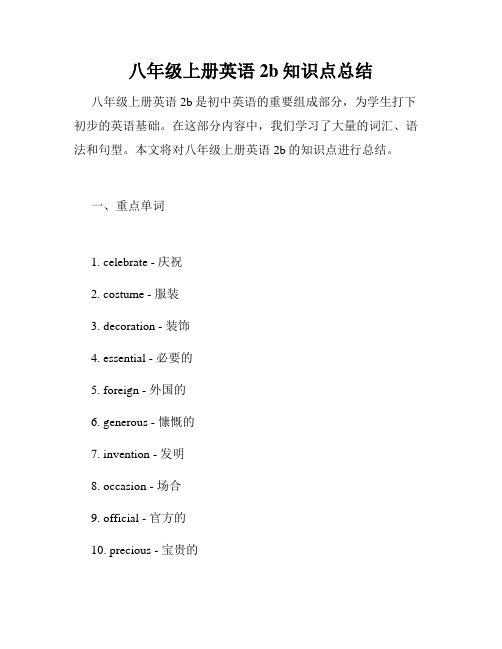
八年级上册英语2b知识点总结八年级上册英语2b是初中英语的重要组成部分,为学生打下初步的英语基础。
在这部分内容中,我们学习了大量的词汇、语法和句型。
本文将对八年级上册英语2b的知识点进行总结。
一、重点单词1. celebrate - 庆祝2. costume - 服装3. decoration - 装饰4. essential - 必要的5. foreign - 外国的6. generous - 慷慨的7. invention - 发明8. occasion - 场合9. official - 官方的10. precious - 宝贵的二、重点语法1. 连词连接两个或更多的单词、短语或从句。
常见的连词有and、but、or、so等。
例句:He likes to play basketball, but he doesn't like to watch it.2. 时态时态分为现在时态、过去时态和将来时态,每个时态还分为简单、进行和完成时态。
例句:She is reading a book right now.(现在进行时)3. 主语和谓语主语是句子中的主要名称、代词或其他名称,而谓语则描述主语的动作或状态。
例句:The baby is sleeping peacefully.(主语是baby,谓语是is sleeping)4. 祈使句祈使句是用来表示命令或请求的句子。
通常不包含主语,用动词原形开头。
例句:Sit down, please.(请坐)三、重点句型1. There be句型There be句型用来表述某个地方有什么东西或人。
主语用there,谓语用be动词。
例句:There is a cat in the garden.(花园里有一只猫)2. It is/was…that句型It is/was…that句型用来强调某个人或物是重要的、有趣的或有价值的。
例句:It was the best trip that I have ever had.(这是我有过的最好的旅行)3. 动名词和不定式的用法动名词和不定式都有名词和动词的特征。
八年级上册英语第五单元2b知识点总结归纳
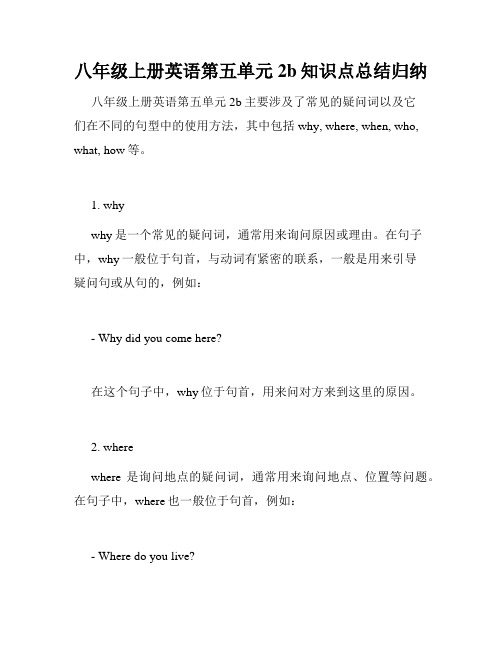
八年级上册英语第五单元2b知识点总结归纳八年级上册英语第五单元2b主要涉及了常见的疑问词以及它们在不同的句型中的使用方法,其中包括why, where, when, who, what, how等。
1. whywhy是一个常见的疑问词,通常用来询问原因或理由。
在句子中,why一般位于句首,与动词有紧密的联系,一般是用来引导疑问句或从句的,例如:- Why did you come here?在这个句子中,why位于句首,用来问对方来到这里的原因。
2. wherewhere是询问地点的疑问词,通常用来询问地点、位置等问题。
在句子中,where也一般位于句首,例如:- Where do you live?这个句子中,where表示询问对方居住的地方。
3. whenwhen表示时间,用来询问时间或事件的发生时间。
在句子中,when位于句首,例如:- When did you arrive in Beijing?当中的when表示询问对方抵达北京的时间。
4. whowho一般用来指人,用来询问人物身份、身份背景等问题。
who通常位于句首,例如:- Who is the girl over there?这个句子中,who表示询问那边的女孩子是谁。
5. whatwhat通常用来询问事物、物品等,表示询问某个东西有什么性质或特点等。
what也常用于询问职业、颜色、形状等方面。
在句子中,what一般位于句首,例如:- What is your favorite color?这个句子中,what表示询问对方最喜欢的颜色是什么。
6. howhow是一个广义的疑问词,可以用来询问各种问题。
how常用来询问方式、方法等。
在句子中,how一般位于句首,例如:- How do you learn English?这个句子中,how表示询问对方学习英语的方式。
本单元的疑问词还包括一些复合疑问词,例如:- What time- How many- How much- How old- What kind of- Which one- Whose这些疑问词的用法也很常见,可以通过练习进行掌握,为英语学习打下更加坚实的基础。
八年级下册英语Unit 3 Section B 2b必会句子

八年级下册英语Unit 3 Section B 2b必会句子1.I don’t understand why some parents make their kids help with housework and chores at home.我不明白为什么有些家长会让他们孩子在家做家务事。
2.Housework is a waste of their time.家务活是浪费他们的时间。
3.They should spend their time on their schoolwork in order to get good grades and get into a good university.他们应该花时间在学校功课上,以便能取得一个好分数,进入更好的大学。
4.It’s parents’job to provide a clean and comfortable environment at home for their children.为孩子在家提供干净舒适的环境是父母的职责。
5.I think it is important for children to learn how to do chores and help their parents with housework.我认为孩子学习如何做杂务和帮助父母做家务事是很重要的。
6.Doing chores helps to develop children’s independence and teaches them how to look after themselves.做无聊的杂事可以培养孩子的独立,教会他们如何照顾自己。
7.Since they live in one house with their parents, they should know that everyone should do their part in keeping it clean and tidy.当他们和父母住在一个房子里的时候,他们应该知道每个人都要为保持房子干净整洁而尽一份力。
八年级上册英语2b中的重点句子(一)

八年级上册英语2b中的重点句子(一)八年级上册英语2b中的重点句子Unit 1Lesson 1•I am very busy this week.•I have three days to go to the countryside.•My sister and I go swimming every day. Lesson 2•Where does your father work?•What does your mother do?•Who do you live with?Lesson 3•What time do you usually get up?•How do you go to school?•Does she take a shower every morning?Lesson 1•How old is your sister?•What is she like?•What does she usually do at weekends?Lesson 2•What sport can you play?•What club do you want to join?•What are you going to do tonight?Lesson 3•Can you play the guitar?•Do you want to be in the school music club?•Are you going to watch a soccer match this weekend? Unit 3Lesson 1•When do you do your homework?•How much time do you spend on homework every day? •What time do you go to bed?•What does he do in the evenings?•How often does she go to a show?•Where does your dad often go on weekends? Lesson 3•Why do you like English?•What subject do you like best?•Who is your favorite teacher?Unit 4Lesson 1•What time do you go to school?•What do you do on weekends?•What time do you want to go to bed? Lesson 2•Does your father go to work by car? •How far is it from your home to school? •Do you often walk to school?•Do you have a good time on weekends? •What do you usually do on Saturdays? •How often do you eat junk food?Unit 5Lesson 1•Can I help you?•I would like a sweater.•How much is this shirt?Lesson 2•What color do you like?•Which dress do you like best?•What size do you wear?Lesson 3•Can I try it on?•Do you want to buy these shoes?•Can I have a look at that watch, please?Lesson 1•Do you often go hiking?•What do you think of hiking?•How often do you go climbing?Lesson 2•What’s the weather like today?•It’s cloudy this afternoon.•How is the weather in your city?Lesson 3•What’s your favorite weather?•When is the best time to go skiing?•Do you like rainy days?这些句子是八年级上册英语2b中的重点句子,掌握了这些句子,可以帮助你更好地理解和运用英语。
八年级上册英语第八单元课文2b知识点
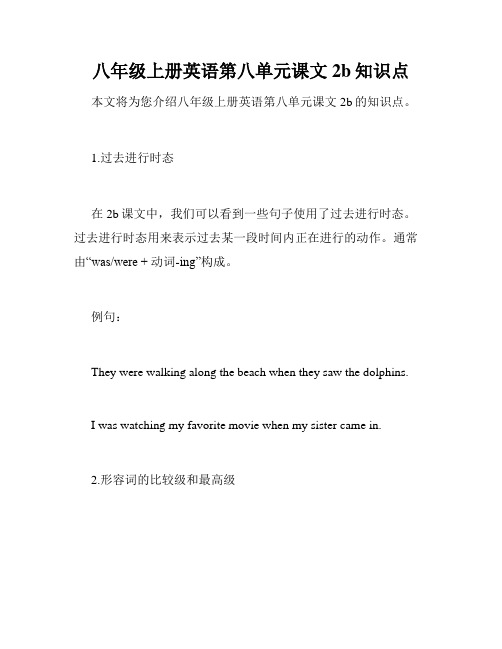
八年级上册英语第八单元课文2b知识点本文将为您介绍八年级上册英语第八单元课文2b的知识点。
1.过去进行时态在2b课文中,我们可以看到一些句子使用了过去进行时态。
过去进行时态用来表示过去某一段时间内正在进行的动作。
通常由“was/were + 动词-ing”构成。
例句:They were walking along the beach when they saw the dolphins.I was watching my favorite movie when my sister came in.2.形容词的比较级和最高级我们在课文中可以看到形容词的比较级和最高级的用法。
比较级用于比较两者之间的差别,最高级用于比较三者或三者以上之间的差别。
比较级的构成:形容词 + -er最高级的构成:the + 形容词的最高级形式例句:The blue hat is more expensive than the red one.She is the best student in our class.3.被动语态被动语态用于强调动作的接受者,而非动作的执行者。
被动语态句子的主语是动作的接受者,而非执行者。
被动语态的构成为“be动词 + 过去分词”。
例句:The book was written by my favorite author.The cake was made by my mom.4.时间状语从句时间状语从句用于引导一个表示时间的从句。
通常由连词“when, while, as, before, after”等引导。
例句:After I finished my homework, I went to bed.When we arrived at the station, the train had already left.5.名词单复数名词单复数在英语中是一个常见的语法问题。
有些名词有固定的复数形式,但大部分名词的复数形式需要在单数形式后加-s或-es。
九年级上册英语人教版第一单元2b知识点

九年级上册英语人教版第一单元2b知识点九年级英语人教版第一单元2b知识点九年级英语人教版第一单元2b是关于“Me, My Family and Friends”主题的。
在这个单元中,我们将学习有关我自己、我的家庭和朋友的表达和相应的句型。
这些知识点对于我们在日常生活中进行交流和描述非常重要。
首先,我们将学习如何自我介绍。
我们可以说“My name is…”来告诉别人我们的名字,然后说一些关于自己的信息,如年龄、“I'm thirteen years old.”喜欢的活动、“I like playing basketball.”,个人特点等等。
这样别人就可以更好地了解我们。
接下来,我们将学习如何向别人介绍我们的家庭。
我们可以用“He/She is…”来告诉别人我们家庭成员的名字。
我们还可以谈论我们的家庭成员的爱好、学校和工作信息,以及他们对我们生活的影响。
“My mother is a doctor. She works hard and takes care of me.”这样的句子可以帮助我们描述我们的家庭成员。
除了介绍自己和家庭成员,我们还可以谈论我们的朋友。
我们可以用“He/She is my friend.”来介绍我们的朋友。
“He is funny and always makes me laugh.”这样的句子可以用来形容朋友的特点。
我们还可以讨论我们和朋友们一起做的活动,以及他们在我们生活中的重要性。
通过这些表达,我们可以更好地与朋友们交流和分享。
此外,在这个单元中,我们还将学习描述地点的词汇和表达方式。
我们可以用“There is/are…”来描述我们所在的地方。
“There isa park near my house.”这样的句子可以告诉别人我们周围的环境。
我们还可以谈论我们去过的地方,以及那些地方给我们带来了怎样的感受。
“I have been to Beijing. It is a beautiful city with a long history.”这样的句子可以帮助我们表达出我们对某个地方的印象。
八年级上册第七单元2b知识点

八年级上册第七单元2b知识点八年级上册第七单元2b知识点主要涉及关于句子成分、主谓一致、时态和语态的基本知识。
以下将逐一展开。
句子成分
在一般情况下,一个完整的句子包含主语、谓语和宾语。
主语是句子的主体,谓语则描述主语的行为或状态,而宾语则接受主语的动作或影响。
在一个句子里还可能包含其他的成分,比如定语、状语、补语等。
主谓一致
主谓一致指的是主语与谓语在人称和数上的一致。
如果主语是单数,则谓语要使用单数形式;如果主语是复数,则谓语要使用复数形式。
在句子中,如果主语是第三人称单数,则谓语要加上“-s”或“-es”。
时态
时态是指动词的时间形态,包括一般现在时、一般过去时、一般将来时等。
在句子中,使用时态可以准确地表达动作发生的时间,同时也可以帮助阅读者更好地理解整个句子。
语态
语态包括主动语态和被动语态。
主动语态强调主语的动作,被动语态则强调承受动作的对象或结果。
被动语态通常由“be”动词加上动词的过去分词构成。
总结
以上就是八年级上册第七单元2b知识点的主要内容。
了解这些基本知识有助于提升句子表达能力、消除语法错误,并提高英语语言的流畅性和准确性。
在接下来的学习中,建议持续加强对这些知识点的掌握和应用能力,从而更好地提高英语水平。
九年级英语上册三单元2b知识点

九年级英语上册三单元2b知识点九年级英语上册的三单元中,2b部分是重要的知识点之一。
在这一部分,学生将学习如何谈论过去发生的事情,以及如何描述过去的经历和事件。
在这篇文章中,我们将深入探讨2b知识点,并提供一些相关练习,以帮助学生更好地理解和掌握这些内容。
在2b知识点中,学生将学习过去时态的构成和用法。
过去时态表示过去发生的动作或状态。
不同的动词在过去时态中有不同的变化形式,主要分为三种:一般过去时、过去进行时和过去完成时。
一般过去时用来描述过去某个具体时间发生的动作或状态,常用的时间状语包括yesterday, last week, ago等。
过去进行时则表示在过去某个时间点正在进行的动作,常用的时间状语包括at that time, when等。
过去完成时则表示在过去某个时间之前已经完成的动作或状态,常用的时间状语包括before, after等。
除了过去时态的构成和用法,2b知识点还包括一些常用的过去时态词汇和短语,例如,happen, arrive, go shopping等。
这些词汇和短语将有助于学生丰富自己的词汇量,并能够更自如地表达过去发生的事情。
为了帮助学生更好地理解和掌握2b知识点,以下是一些练习题:1. 用适当的过去时态填空:a. I ________ (go) to the park yesterday.b. They ________ (visit) their grandparents last week.c. She ________ (cook) dinner when the phone rang.2. 把下列句子改写成过去进行时态:a. He is playing football now.b. They are having lunch at the restaurant.3. 把下列句子改写成过去完成时态:a. I have finished my homework.b. They have traveled to many countries.4. 根据所给的句子,回答问题:a. He went to the cinema yesterday. (When did he go to the cinema?)b. They were watching TV at 8 o'clock last night. (What were they doing at 8 o'clock last night?)通过以上的练习题,学生可以巩固他们对于过去时态的理解和应用。
八年级上册英语2b中的重点句子(二)

八年级上册英语2b中的重点句子(二)八年级上册英语2B中的重点句子Unit 1Lesson 1•I am really nervous.•There are 30 students in my class.•We have lots of fun there.•How much time do you spend on doing homework every day? •I am from China.Lesson 2•I have got two brothers and one sister.•My brothers are good at playing football.•I am good at English.•They are good friends.•We often play together.•How about you?Lesson 3•How are you?•What do you look like?•What does he look like?•She has long hair.•He has short hair.•She has big eyes.Unit 2Lesson 1•I eat breakfast at 7:00•He goes to school at 8:00•She has dinner at 6:30•I go to bed at 10:00Lesson 2•I like playing sports.•She likes singing and dancing. •They love playing computer games. •He doesn’t like watching TV.•We don’t love eating fast food.Lesson 3•Does he often study English at home?•Do they sometimes go shopping on weekends? •Does she usually play the piano?•Do you often help your parents?Unit 3Lesson 1•I have a busy weekend.•I am good at cooking.•They are interested in playing basketball. •She is good at swimming.•We are not interested in watching movies. Lesson 2•What do you do on weekends?•I usually go shopping.•Do you often go fishing?•He never plays computer games.•They sometimes visit their grandparents. Lesson 3•Can you play the guitar?•Yes, I can.•No, I can’t.•Can he swim?•Can she speak French?Unit 4Lesson 1•I don’t have any hobbies.•She is good at playing the piano.•He is interested in drawing.•They are good at singing.•We are not interested in painting. Lesson 2•What are your hobbies?•My hobbies are reading and playing chess. •I like collecting stamps.•What does he like doing?•They like watching movies.Lesson 3•How often do you go swimming?•I go swimming twice a week.•He goes hiking once a month.•They never play basketball.•She sometimes rides a bike.这些句子是八年级上册英语2B中的重点句子,希望对你有所帮助!。
八年级上册三单元2b知识点

八年级上册三单元2b知识点八年级上册三单元的2b部分是语法部分,主要涉及到介词的使用。
介词是指用来表示名词或代词与其他句子成分之间关系的一类词语。
以下详细介绍2b部分的知识点。
一、介词的定义和分类介词是一种虚词,它用来表示名词或代词与其他句子成分之间的关系。
常用的介词有about, above, across, after, against, along, among, around, at, before, behind, below, beneath, beside, between, beyond, by, down, during, except, for, from, in, inside, into, like, near, of, off, on, onto, out, outside, over, past, round, since, through, throughout, to, toward, under, underneath, until, up, upon, with, within, without等。
介词按其含义可分为:时间介词、地点介词、原因介词、目的介词、比较介词、方式介词、条件介词、让步介词等。
二、介词的用法和注意点1. 介词的前面必须有名词或代词作宾语。
例如:He came to the office.(他来到了办公室。
)2. 介词的宾语可以是名词或代词,但是介词后面不能再加定冠词。
例如:I am interested in sports.(我对体育感兴趣。
)3. 有些介词虽然代表时间或者地点,但是它们不能与表示时间和地点的名词连用。
例如:I arrived in Beijing at four o'clock.(我四点钟到达北京。
)(x)I arrived at Beijing at four o'clock.4. 介词的用法和含义常常与其相关的动词和形容词有关系。
- 1、下载文档前请自行甄别文档内容的完整性,平台不提供额外的编辑、内容补充、找答案等附加服务。
- 2、"仅部分预览"的文档,不可在线预览部分如存在完整性等问题,可反馈申请退款(可完整预览的文档不适用该条件!)。
- 3、如文档侵犯您的权益,请联系客服反馈,我们会尽快为您处理(人工客服工作时间:9:00-18:30)。
1、Come back, Spotty.
2、Go there, Spotty.
3、There is a lamp on the table.
1、There is a bag on the bed.
2、Draw the duck on the ground.
3、
Come here, Spotty. 1、I can swing. 2、Open the door. 3、Clean your room.
1、Open your mouth.
2、Open the window.
3、Don ’t walk on the
grass.
1、I can walk.
2、Turn off the tap.
3、Don ’t climb the
tree.
4、Draw the cow on
the paper.
牛津英语2B 句子练习
班级 __________ 姓名___________
一、句子和图片搭配练习。
第一组
( ) ( ) ( )
第二组
( ) ( ) ( )
第三组
( ) ( ) ( )
第四组
( ) ( ) ( )
第五组
( ) ( ) ( ) ( )
1、Run like a dog.
2、Walk like a cat.
3、I t’s nine o ’clock.
4、I can skip.
1、Swing like a
monkey.
2、Turn on the tap.
3、I t’s seven o ’clock.
4、Swim like a fish.
1、Turn off the tap.
2、Wash your hands.
3、My shirt is dirty.
4、Wash your towel.
1、Wash your face.
2、Don ’t ride a bicycle
here.
3、I wash Spotty with water.
1、Drink some water.
2、I can climb.
3、Brush your teeth.
4、Eat some cake.
( ) ( ) ( ) ( )
第七组
( ) ( ) ( ) ( )
第八组
( ) ( ) ( ) ( )
第九组
( ) ( ) ( )
第十组
( ) ( ) ( ) ( )
1
、I like to eat.
2、I hear a sheep.
3、Bring me a bowl.
4、Give it to Kitty.
1、Play on the beach.
2、Pick up the shells.
3、Go to the beach.
4、I like to drink.
1、The sun is hot.
2、Under the umbrella.
3、It’s ten o’clock.
Go to bed.
4、It’s seven o’clock.
Get up.
1、I am hungry.
2、Get up.
3、
Have lunch.
1、It
’s ten o’
clock.
2、I like to sleep.
3、Go to school.
( ) ( ) ( )
( )
第十二组
( ) ( ) ( )
( )
第十三组
( ) ( )
(
)
( )
第十四组
( ) ( ) ( )
第十五组
( ) ( ) ( )
二、圈出正确的答语。
1、What do you see? A) I see a sheep. B) I hear a chick.
2、What do you hear? A) I see a sheep. B) I hear a chick.
3、What can you do? A) I see a tree. B) I can climb.
4、What time is it? A) I see a sheep. B) It’s seven o’clock.
5、I’m sorry. A) It’s OK. B) I am sorry, too.
6、Do you like animals? A) Yes, I do. B) Yes, please.
7、What do you want? A) I like to eat. B) I want some bread.
8、What can Spotty do? A) Spotty can run. B) I can run.
9、Four spoons? A) I want four spoons. B) Yes, please.
10、Let’s go to the beach. A) OK. B) I like winter.
三、认读下列句子。
1、A) I wash my hands.. B) I wash my hair.
2、A) What do they want? B) What do you want?
3、A) Turn on the tap, please. B) Turn off the tap, please.
4、A) I don’t like coffee . B) I don’t like cakes.
5、A) I’m hungry. B) I’m thirsty.
6、A) My face is dirty. B) My hands are dirty.
7、A) It’s under the bed. B) It’s on the bed.
8、A) It’s six o’clock. B) It’s three o’clock.
9、A) I like to swim. B) I like to swing.
10、A) The bear can ride. B) The bear can run.
11、A) Come here B) Go there.
12、A) Close the window. B) Clean your room.
13、A) There is a lamp on the table. B) There is a sofa in the room.
14、A) Wash your towel. B) Wash your hands.
15、A) I wash my hands with water. B) I wash my hands with soap.
16、A) Wash Spotty with your hands. B) Wash Spotty with your towel.
17、A) Bring me a plate. B) Bring me a knife.
18、A) I want some juice. B) I want some bread.
19、A) Have lunch. B) Have breakfast.
20、A) I can swing. B) I can swim.
答案:一:231、231、231、321、3124、4213、4132、4123、312、3142、3412、4312、4213、321、321 二:ABBBA ABABA。
